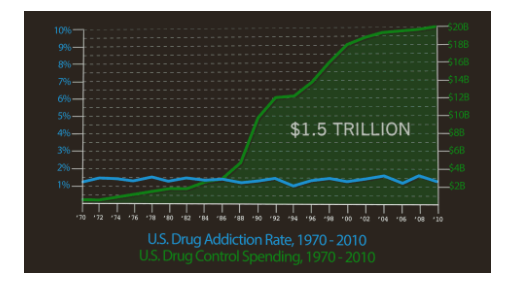It’s time to end the War on Drugs. It was started by Richard Nixon in 1971, when the world was a very different place. Over the intervening 45 years the War on Drugs has become an unwieldy, costly, robotic monster. Yes, the term ‘War on Drugs’ is retired, but the policies continue: the 2016 budget for the Drug Enforcement Administration is over $2 billion, and I’m sure you’ve noticed the Federal government’s opposition to marijuana legalization in the states.
The only purpose for which power can be rightfully exercised over any member of a civilized community, against his will, is to prevent harm to others. His own good, either physical or moral, is not sufficient warrant.
— John Stuart Mill
Here are the arguments, pro and con.
No – Continue Prohibition
The core argument in favor of the current approach is that legalization will lead to increased consumption, and that increased consumption in turn will result in more public health problems and a rise in crime. This was described in a Charles Krauthammer editorial published by the Washington Post:
Do we really want the additional and permanent burden of the other intoxicants, some of which are infinitely more addictive than alcohol? … With cocaine and heroin (and drug cocktails yet to be imagined) readily available, additional transportation deaths alone — think just of the highway toll — would dwarf the current number of drug-related deaths.
Yes – End Prohibition
On the other side, there are two core arguments against what we’re doing today. First, there is plenty of evidence prohibition is counter-productive; and second, there is strong evidence legalization (ending prohibition) works.
Prohibition is Counter-Productive
The current prohibition campaign is very expensive. Harvard economist Jeffrey Miron was interviewed by the German news site SPIEGEL ONLINE and asserted “If it legalized drugs, the United States could save $85 billion to $90 billion per year. Roughly half that is spent on the current drugs policy and half that is lost in taxes that the state could have levied on legal drugs.”
Plus, all that spending has not driven down addiction rates. See the following chart from The Atlantic.

Aside from cost and ineffectiveness, the War on Drugs is also destructive. A report published by the London School of Economics said this:
The pursuit of a militarised and enforcement-led global ‘war on drugs’ strategy has produced enormous negative outcomes and collateral damage. These include mass incarceration in the US, highly repressive policies in Asia, vast corruption and political destabilisation in Afghanistan and West Africa, immense violence in Latin America, an HIV epidemic in Russia, an acute global shortage of pain medication and the propagation of systematic human rights abuses around the world.
Legalization Works
The second argument against prohibition is that legalization works. In 2001 Portugal became the first European country to officially abolish all criminal penalties for personal possession of drugs, including marijuana, cocaine, heroin and methamphetamine. The results were summarized on the web site Business Insider:
- Drug-related HIV infections have plummeted by over 90% since 2001, according to the drug-policy think tank Transform.
- Drug-related deaths in Portugal are the second-lowest in the European Union. Just three in a million people die of overdoses there, compared with the EU average of 17.3 per million.
- The number of adults who have done drugs in the past year has decreased steadily since 2001.
- Compared to rest of the EU, young people in Portugal now use the least amount of “legal high” drugs like synthetic marijuana, which are especially dangerous.
- The percentage of drug-related offenders in Portuguese prisons fell from 44% in 1999 to 21% in 2012.
- The number of people in drug-treatment increased 60% from 1998 to 2011 from 23,600 to 38,000.
The Bottom Line
We can’t win it. We have no strategy to win it.
The War on Drugs is worse than just a lost cause. The 2016 Democratic and Republican party platforms offer no new ideas, and drug enforcement policy is not an issue in the Presidential campaign, so apparently the plan is to continue the same approach.
Given the impact on our own citizens and on friends and allies, it’s obvious that prohibition does more harm than good. It’s an expensive, nonsensical, destructive, dead end.
End it.
Legalisation would not only drive away the gangsters; it would transform drugs from a law-and-order problem into a public-health problem, which is how they ought to be treated.